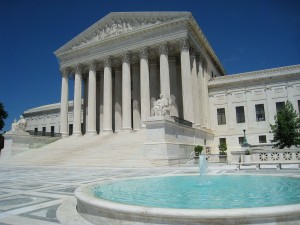Experienced Federal Appeal Attorneys: Knowledgeable Depiction for Complex Situations
Experienced Federal Appeal Attorneys: Knowledgeable Depiction for Complex Situations
Blog Article
Demystifying the Process of Federal Appeals: What You Need to Know
Browsing the complex world of federal appeals can typically feel like passing through uncharted waters for those unknown with the process. Understanding the nuances of appellate court territory, the intricacies of filing a notification of allure, offering a compelling brief, and making a convincing dental argument are essential elements that can considerably impact the result of a situation. By unwinding the layers of intricacy surrounding federal allures, individuals can obtain a more clear insight right into the devices that regulate this important stage of the legal system.
Understanding Federal Appeals Refine
Exploring the detailed world of the government charms process introduces a structured and systematic journey through the judicial system. Federal allures work as a vital device for examining decisions made by reduced courts. Recognizing this procedure is vital for anybody associated with lawful process at the federal degree.
The procedure commonly begins with an event dissatisfied with a reduced court's ruling filing a notification of allure. This causes a review by a higher court, where a panel of courts assesses the legal arguments presented by both events. Briefs outlining the legal thinking behind each party's position are sent, and oral debates may be heard to clear up complex issues.
The appellate court's choice is based upon a complete evaluation of the lower court's proceedings and the disagreements presented. The judges do not concentrate but reexamine facts on whether lawful mistakes took place that impacted the lower court's decision. As soon as the appellate court reaches a decision, it can affirm, reverse, remand, or change the lower court's judgment, supplying clearness and finality to the lawful disagreement. Comprehending this process is essential for navigating the complexities of federal allures effectively.
Appellate Court Territory Explained
Appellate court territory refers to the range of cases that a particular appellate court has the power to choose and review upon. Unlike trial courts that listen to cases for the initial time, appellate courts are limited to assessing choices made by reduced courts.
Appellate courts have jurisdiction over particular sorts of situations, typically those involving legal mistakes, procedural problems, or inquiries of regulation as opposed to accurate disagreements. The jurisdiction of appellate courts is normally detailed in laws and legislations that regulate the court system. Understanding appellate court territory is critical for events associated with the appeals procedure as it identifies whether a situation is qualified for testimonial and the degree to which the appellate court can intervene in the reduced court's choice.
Declaring a Notification of Charm
The first action in beginning the federal allures process includes submitting a Notice of Allure with the appropriate appellate court. This essential record officially notifies the court and the other parties included in the instance that the appealing celebration plans to look for a review of the lower court's choice. Submitting a Notice of Charm is a stringent step-by-step need that sets the appellate procedure in activity.
When preparing the Notice of Appeal, it is necessary to make certain conformity with the certain policies and standards of the relevant appellate court. federal crime lawyer. The paper needs to normally consist of info such as the situation name, the lower court's name, the date of the judgment being appealed, and a succinct declaration showing the premises for the allure

Instruction and Dental Debate
In the appellate procedure, offering created briefs and taking part in oral arguments play critical duties in promoting for the appealing celebration's placement before the appellate court. Briefs are detailed lawful documents that describe the parties' debates, legal authorities, and analysis sustaining their positions. These created entries give the court with a thorough understanding of the realities of the instance, the appropriate law, and why the appealing event believes the reduced court's decision ought to be reversed.
Adhering to the entry and review of the briefs, dental debates use the celebrations an opportunity to additional clarify their settings, address any type of concerns the appellate courts may have, and emphasize key factors from their composed briefs. Dental arguments are an opportunity for the lawyers to encourage the courts through verbal advocacy and responses to inquiries from the bench.
Both the composed briefs and dental debates are critical components of the appellate procedure, allowing celebrations to provide their case completely and compellingly before the appellate court. - federal crime attorney
Receiving the Appellate Court Decision
Upon conclusion of dental debates and entry of written briefs, the next critical phase in the appellate process entails waiting for the crucial judgment from the appellate court. This duration of expectancy can be filled up with a mix of stress and anxiety and wish for events associated with the allure. The appellate court's decision is generally delivered in a written format and describes the court's final thoughts on the legal concerns offered, the reasoning behind their choice, and the judgment provided. The moment frame for receiving the appellate court's choice can vary, but courts strive to supply timely resolutions. As soon as the decision is released, events must very carefully assess the court's ruling to understand the result and identify any more steps that might be needed. Whether the appellate court verifies, turns around, or remands the reduced court's choice, understanding the implications of the ruling is crucial for all parties included in the appellate process. Immediately assessing and comprehending the appellate court's decision is vital in navigating the following steps in the legal learn the facts here now proceedings.
Conclusion
In final thought, the federal appeals procedure is a complex but essential action in looking for justice. Recognizing the appellate court territory, filing a notice of appeal, preparing briefs, and providing oral debates are all important parts of this procedure. Inevitably, getting the appellate court choice can offer quality and resolution to lawful disputes. It is essential to navigate the government appeals process with diligence and focus to information to attain a reasonable result.
As we proceed from understanding the federal charms procedure to studying the details of appellate court territory, a basic facet comes to light regarding the authority and restrictions of these higher courts in the legal landscape. Appellate court jurisdiction refers to the extent of situations that a certain appellate court has the power to assess and determine upon. Unlike trial courts that listen to situations for the very first time, appellate courts are limited to examining choices made by lower courts. Comprehending appellate court territory is crucial for parties included in the allures procedure as it establishes whether a case is qualified for review and the degree to which the appellate court can intervene in the reduced court's choice.

Report this page